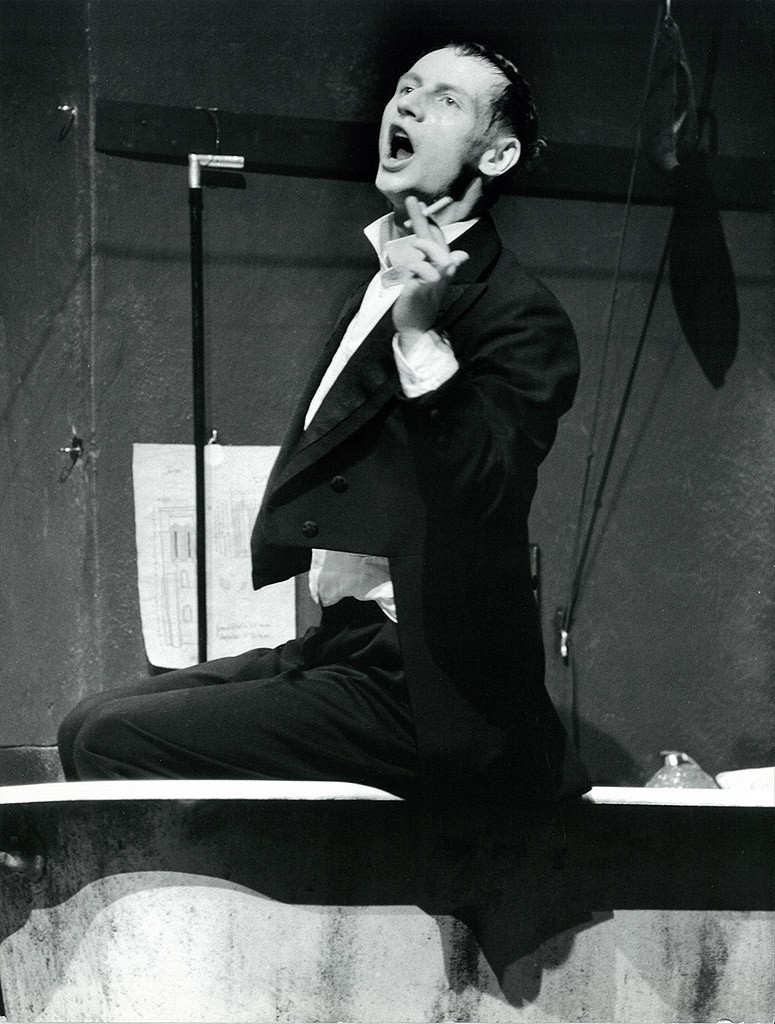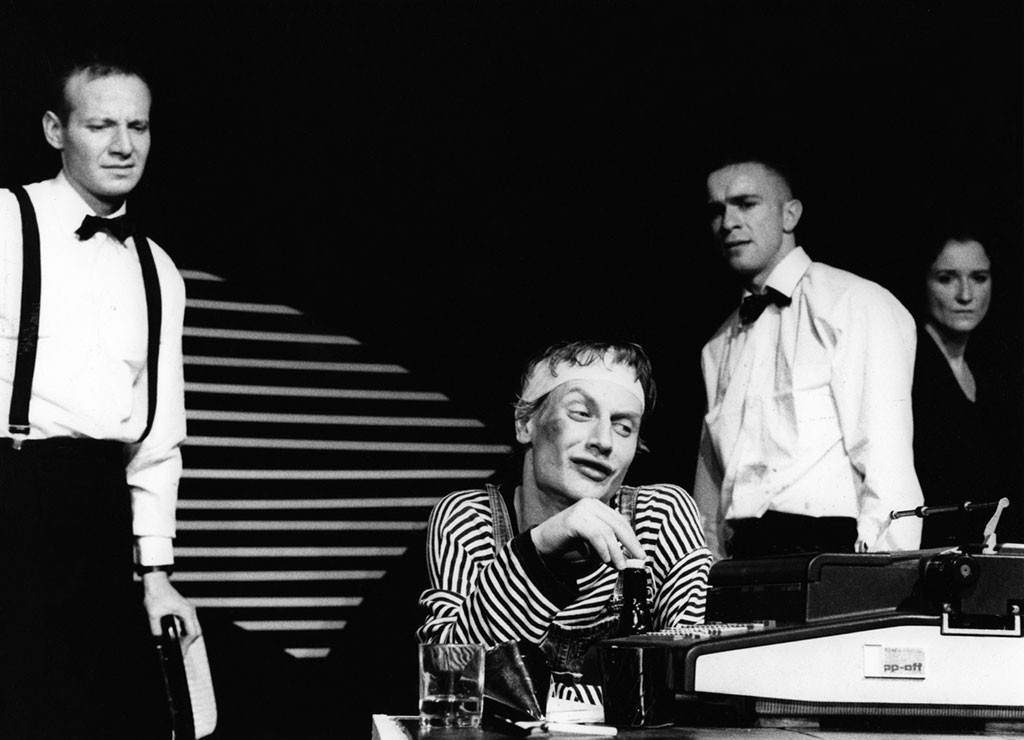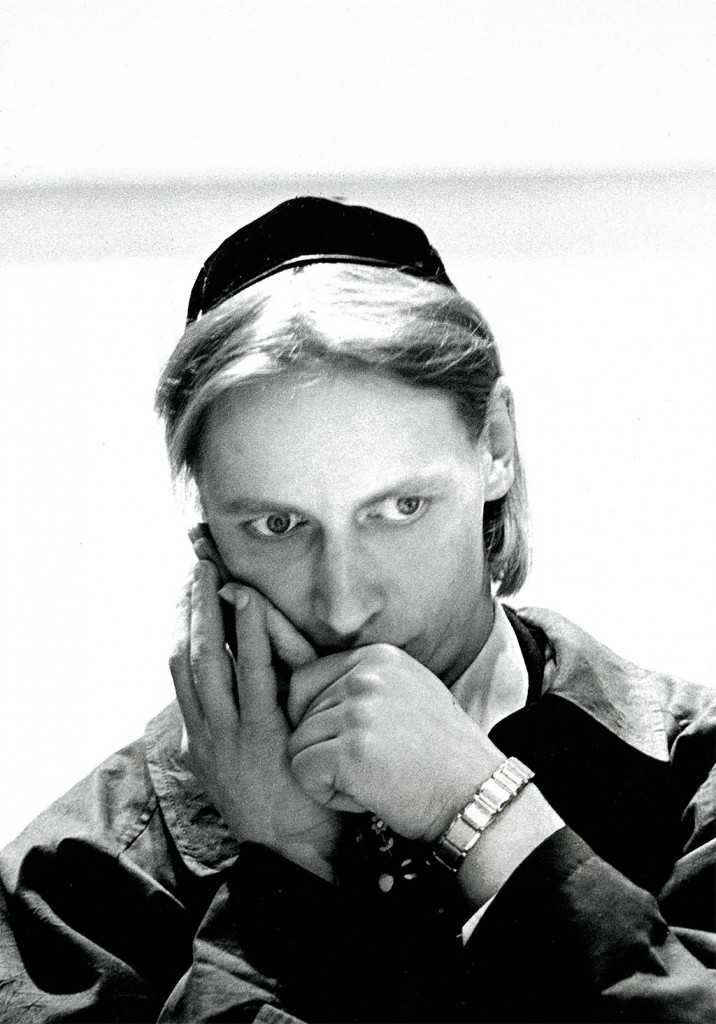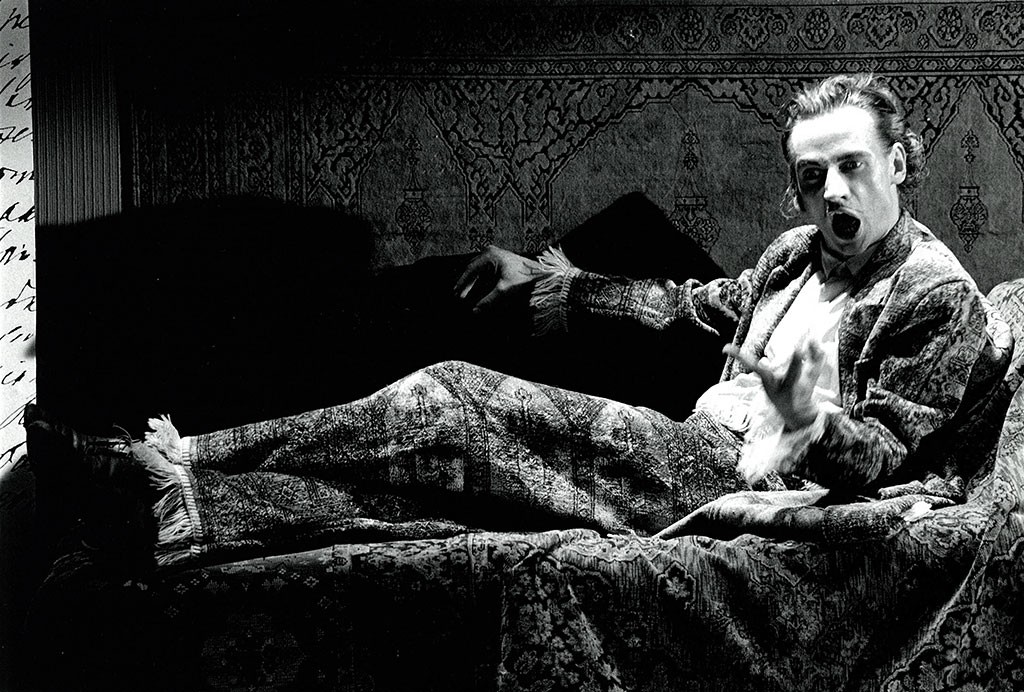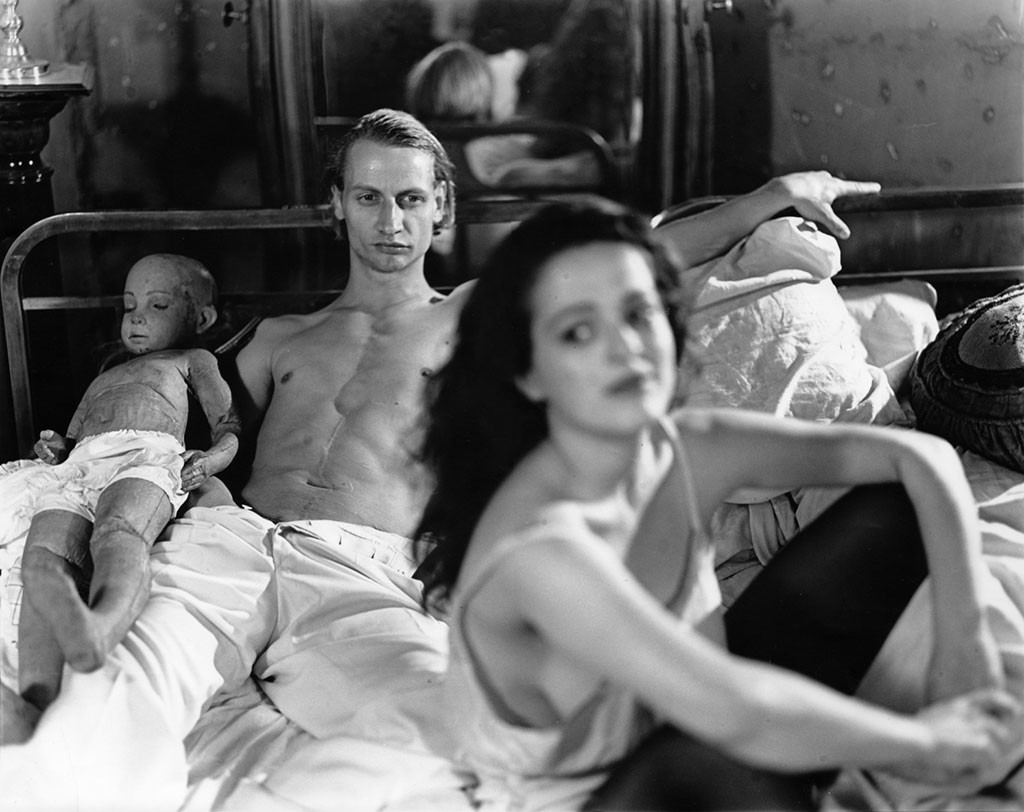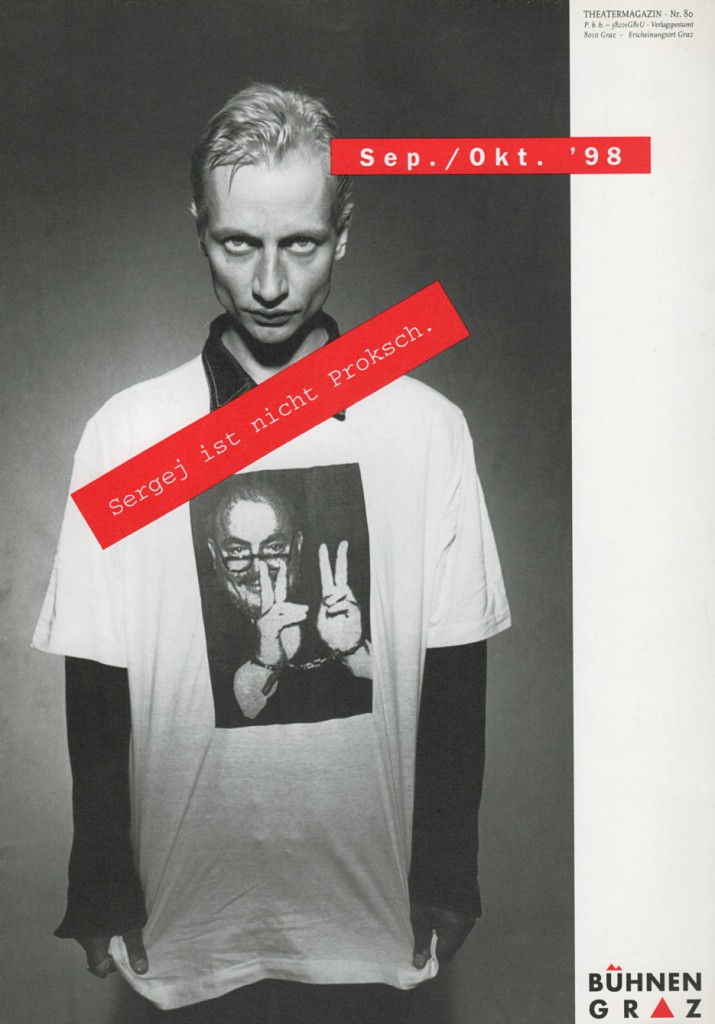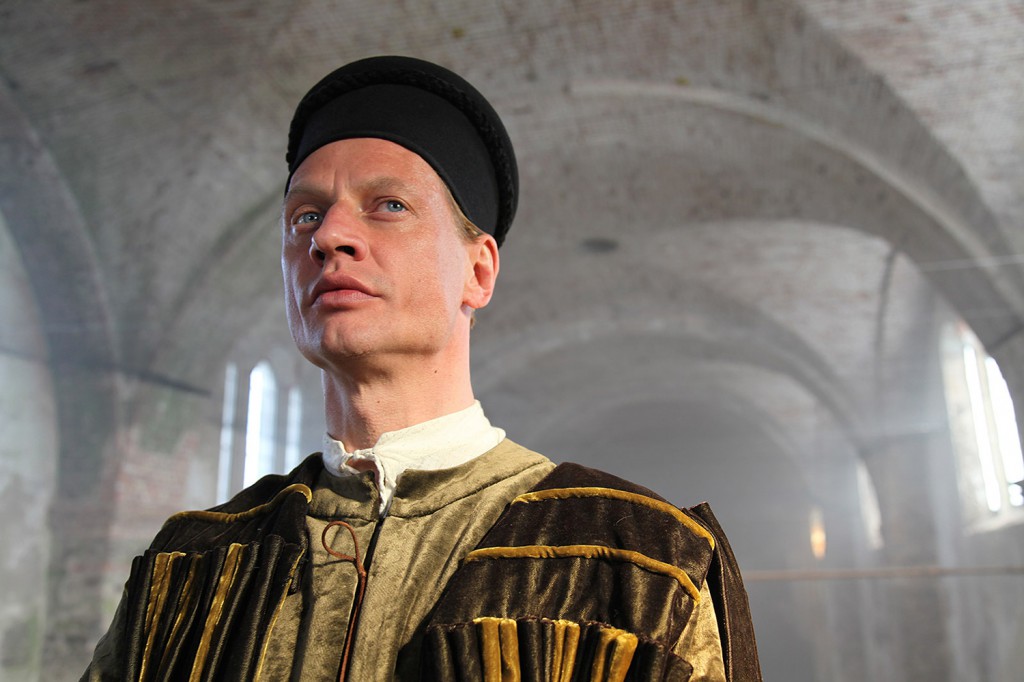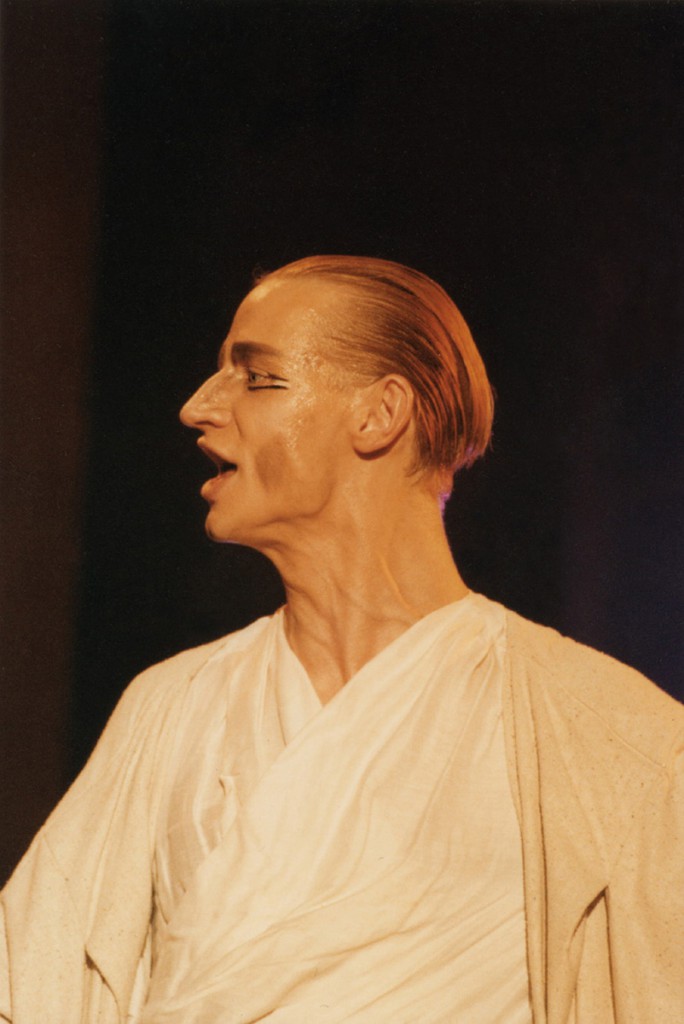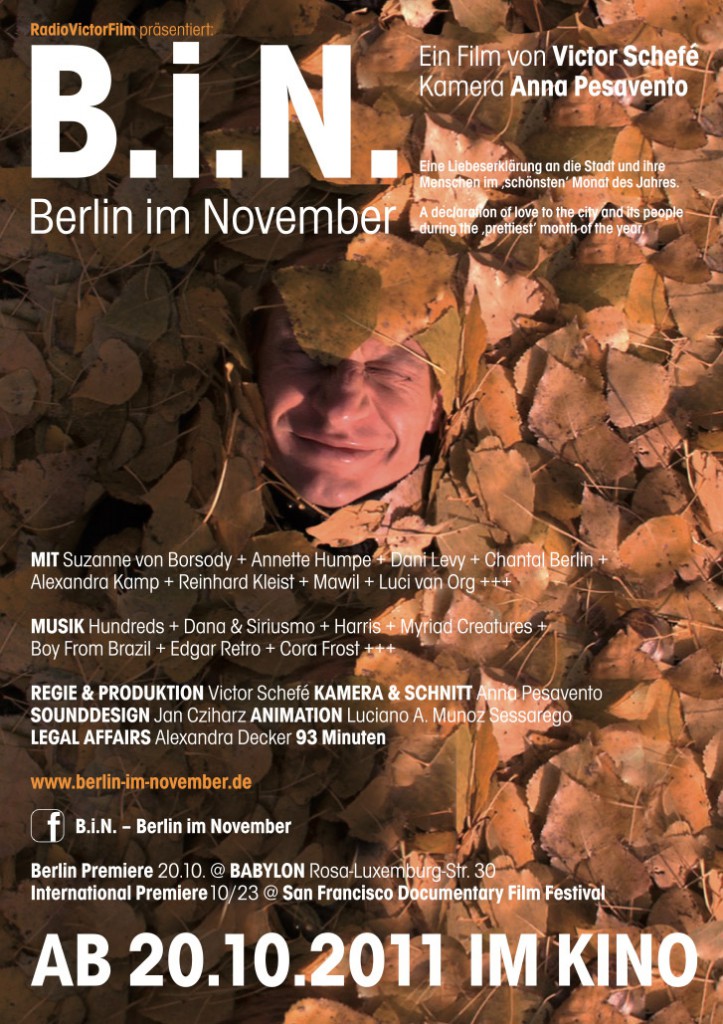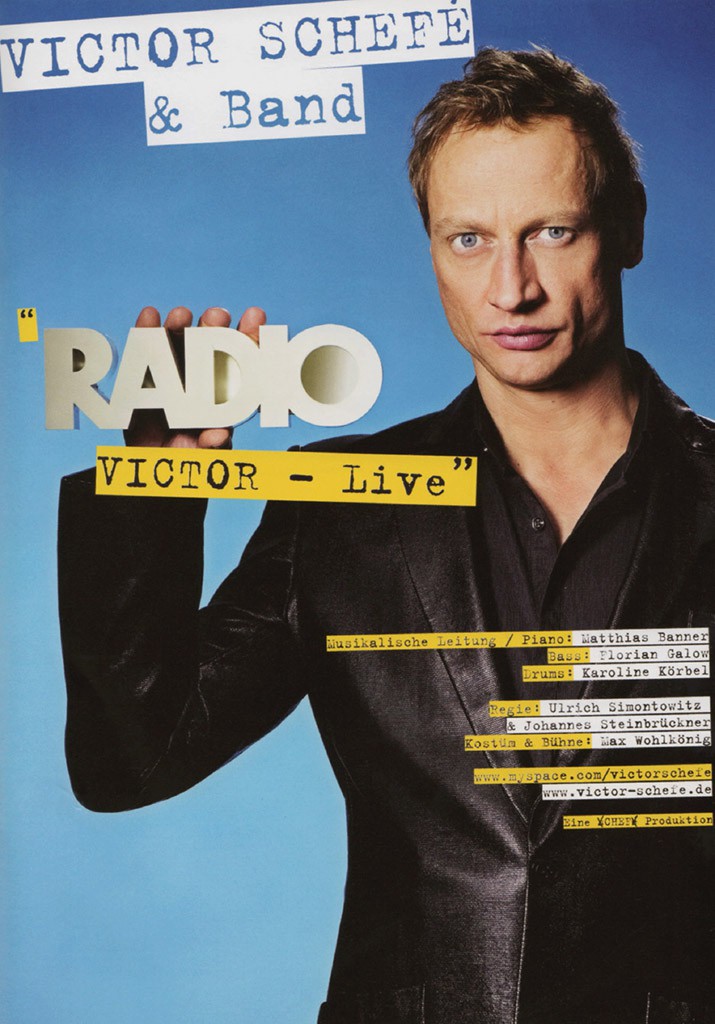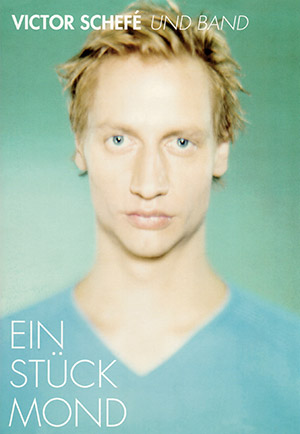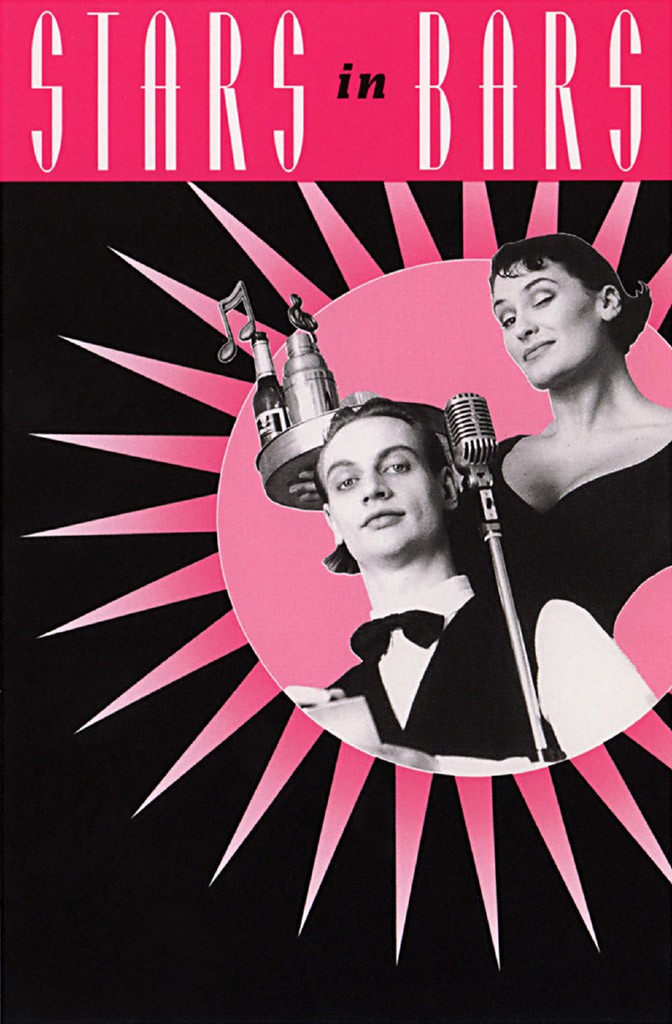The Elephantman
by Bernard Pomerance
Theater am Kürfürstendamm, Berlin
Title role, Director: Ulrich Simontowitz
„And then there’s Victor Schefé as John Merrick. His role is a feat of strength in terms of language alone. But the way he manages to present to us the Elephant Man without using a mask, to represent with a few gestures and the expressions on his face all the suffering, yearning and joy of somebody who is mortally ill, that is an exquisite pleasure of a very rare variety.“
Zitty (Stefan Buchenau) 15/91
„But Schefé opens up so much of a different world with his character, captures our thoughts and emotions so enduringly that the familiar world with all its vanities loses its importance. So impressive is the presentation of a picture of chaste love that Schefé is subsequently able to convey the entire tragedy of Merrick in one softly spoken question: ‘Why does she not return?’ The evening belonged to Victor Schefé.“
Berliner Zeitung (Julia Michelis) 25.06.1991
„When, at last, the Elephant Man shows himself to the audience, what we see is not an actor made-up to look deformed but one who acts out ugliness or is able, more precisely, to convey how it feels to know that your appearance frightens other people. Victor Schefé is touching and magnificent, his humility drenched in infinite sorrow.“
SFB – Galerie des Theaters (Rhode) 23.06.1991
„Unlike in the film, no mask is worn in this production of “Elephant Man” – and it’s better that way. With breathtaking facial acrobatics, Victor Schefé portrays disfigurement with the honest means of the art of bodily expression.“
BZ (Claus B. Maier) 24.06.1991
„When we finally get to see the deformed creature, he’s sitting in the bathtub, dressed in tails. His eyes hunted, Victor Schefé lisps and slurs, slavers and gulps, groans and stammers, croaks and chomps. Possessed of the gentle demeanor of a martyr, he works obsessively on his model church. Inhales his first cigarette like a proud schoolboy. Stares in curiosity at the breasts of a woman who opens her corsage in front of him. This gawkily sad Romeo-and-Juliet vignette is a highlight of the evening.“
Die Tageszeitung (baal) 05.07.1991
CLOWNS IN THE KITCHEN
by Jeff Hagedorn
German-language premiere – Ensemble Theater, Berlin
Role: Ken, Director: Donald Berkenhoff
„Victor Schefé plays Ken in a way that reveals how damaged the figure is without any show of self-pity. During Ken’s worst moments, he sits there as if the skin has been stripped from his body. When he describes getting beaten up, the shame and humiliation he experienced unsettle us more than anything else. Schefé did not disappoint the expectations raised by his performance in ‚The Elephant Man.’“
Berliner Zeitung (Julia Michelis) 20.01.1992
“’Clowns in the Kitchen’ is important, a play worth seeing. It lives from those moments of intensity brought about first and foremost by Victor Schefé’s portrayal of Ken.“
Magnus (Axel Schock) 02/1992
DEAD MOTHER
by David Greenspan
German-language premiere – Stükke Theater
Roles: Onkel Saul & Alice B. Toklas, Director: Donald Berkenhoff
„Greenspan’s play runs contrary to logic and conventional dramatic structures. Berkenhoff mixes his potpourri of pain, irony and deeper meaning with simple but effective means – aided not least by a precisely directed ensemble in which two figures are outstanding: Andreja Schneider as the garrulous Maxine, and Victor Schefé as Uncle Saul. The latter’s monologue, about a dental assistant and the microbe colonies in patients’ mouths amounts virtually to a play-within-a-play. Delivered by Schefé in a wheelchair, it becomes an apocalyptic vision that briefly transforms the comedy into naked horror.“
Magnus (Axel Schock) 06/1993
ANGELS IN AMERICA
by Tony Kushner
German-language premiere – Schauspielhaus Wien
Role: Louis Ironson, Director: Hans Gratzer
„Victor Schefé plays Louis, and his performance is a minor work of art. He creates a figure who still rouses compassion even as he inflicts injury on others. He sniffs and fumbles. All his emotions are articulated in gestures and facial expressions. It would be considered outrageous – if it were not a character who consistently overdoes hate and love alike.“
Die Presse, Wien (Bettina Steiner) 16.01.1995
„The beaky-faced Victor Schefé is particularly impressive. The blond, not very tall, actor is no oil-painting. His eyes are as eloquent as his hands. They can sulk, and shyly flirt. They can beg and plead; lash out and snort. Half-hearted excuses are the specialty of these eye. Schefé turns anger and love into ecstasy.“
Süddeutsche Zeitung (C. Bernd Sucher) 16.01.1995
HYSTERIA
by Terry Johnson
German-language premiere – Schauspielhaus Wien
Role: Salvador Dalí, Director: Gerhard Willert
„Monty Python would take great delight in Dalí as played by Victor Schefé.“
Kronenzeitung (Thomas Gabler) 29.04.1995
„Gerhard Willert’s production for the Vienna Schauspielhaus is agile, and the cast excellent: Rainer Frieb (as Freud), Sylvana Krappatsch, and the brilliant Victor Schefé.“
Volksblatt Wien (Renate Wagner) 29.04.1995
„Victor Schefé in the role of Dalí gives a brilliant performance as Surrealism personified.“
Täglich Alles, Wien 29.04.1995
ALMA – A SHOW BIZ ans Ende
by Joshua Sobol
World premiere – Wiener Festwochen
Role: Walter Gropius, Director: Paulus Manker
„In the role of the feeble Gustav Mahler, Helmut Berger is as subtle as Victor Schefé is tempestuous and fanatical in the role of Alma’s second husband Walter Gropius.“
Salzburger Nachrichten (Julia Kosbach) 03.06.1996
„The actors face the difficult task of capturing the viewers’ attention from the word go. This is best accomplished by Helmut Berger as Gustav Mahler and Victor Schefé in the role of Walter Gropius.“
Täglich Alles, Wien (Paul Kruntorad) 03.06.1996
SERGEJ
by Alexander Widner
World premiere – Steirischer Herbst, Schauspielhaus Graz
Title role, Director: Christian Stückl
„The only triumph of the evening belonged to Victor Schefé: He plays Kron as a disturbingly flamboyant verbal terrorist with evilly infantile dimensions. We are reminded of Kinski, Brandauer or the Natural Born Killer Woody Harrelson.“
Kleine Zeitung (Frido Hütter) 28.09.1998
„ … Victor Schefé from Berlin, a young blond actor with striking features and a flickering-tongued John Malkovich mouth. He threw himself into the part as if it was a matter of his own salvation. He’s the little prince that Richard III. wants to be, a cynical yuppie who hates the world for being a home to people like himself. Schefé gives a performance falling somewhere between Klaus Kinski and Oskar Werner, very intensive, with cold madness and comic defiance. But he can salvage nothing – apart from, perhaps, his own dignity as an actor.“
Süddeutsche Zeitung (Christine Dössel) 29.09.1998
„Most of the very sparse applause rightfully went to the lead actor Victor Schefé, whose debut at Graz was of an intensity reminiscent of Gert Voss’ Richard III.“
Die Neue Furche (Harald Halsmayr) 01.10.1998
„The Graz production, presenting a distorted mirror-image of society, seemed successful to me on the whole. Not least due to the fascinating performance by the figure Kron, played by the young actor Victor Schefé.“
Theater der Zeit 06/1998
„Victor Schefé in the title role delivered a tour de force of wholly unselfconscious theatrical exhibitionism.“
Nürnberger Nachrichten (Paul Kruntorad) 30.09.1998
„Even Victor Schefé, a furious stage presence for the space of two hours, was not capable of breathing life into Widner’s lifeless silhouettes.“
Berliner Zeitung (Thomas Götz) 30.09.1998
„It would be hard to find another actor able to screw his face up in disgust as artfully as Victor Schefé.“
Theater heute (Wolfgang Kralicek) 11/98
„Director Christian Stückl concentrates the action wholly on the Stalin-quoting title role. And despite the very short rehearsal period (Paulus Manker dropped out of the production only a few weeks ago), Victor Schefé turns it to his advantage. He is a master of blasphemy and respectlessness, a megalomaniac and vulgar fool, a “human sponge.” His oscillation between infantilism and demonic unpredictability is a classy performance.“
Salzburger Nachrichten (Martin Behr) 28.09.1998
„Victor Schefé plays Kron with admirable zeal and remarkably nuanced speech. The Janus face he presents is mischievously diabolic.“
Neue Kronenzeitung (Bernd Schmidt) 28.09.1998
BUMPS N GRINDS
Bar jeder Vernunft, Berlin
Role: Mr. Richard Smoker, Director: Andreja Schneider
„Under the direction of Andreja Schneider, the actor Victor Schefé appears in the guise of showmaster Mr. Richard Smoker. In his night club he presents a tasty collection of pussy cats known as “The Teaserettes,” Germany’s first New Burlesque group… Among all the spangles and glitter the secret star is Victor Schefé, whose slicked-back hair and smoky baritone makes him the incarnation of a faintly sleazy go-go bar host. And whenever he starts to sing, the audience holds its breath.“
Berliner Morgenpost (Ulrike Borowczyk) 01.12.2005
POPULAR FACES THAT YOU WANT TO SEE MORE OFTEN ON TV
„It is true that you get the feeling of always seeing the same faces in the perpetually same roles on ARDZDFRTLSAT1. For a change on all channels, the BILD-am-Sonntag editorial staff – using solely subjective criteria – sought out exactly those actors for whom we would be guaranteed to turn on television again:
Victor Schefé: because this type of character actor is difficult to find on German television. Sometimes nasty (“Polizeiruf”), sometimes funny (“Bewegte Männer”), sometimes icy cold (“Borgia”) – and always so that you never forget him.“
BILD am SONNTAG 27.10.2013
BORGIA
by Tom Fontana
Canal+ – 2010–2014 (3 Seasons)
Role: Johann Burchard, Director: Oliver Hirschbiegel, Metin Huseyin, Dearbhla Walsh, Christoph Schrewe, Athina Tsangari
„As the Papal Master of Ceremonies, one must cool one’s blood down to freezing, must look with tunnel vision – must keep a strict eye on god and the world. And one speaks with a heavy German tongue, which doesn’t draw a second glance in ZDF because the tumult around the pope here has been translated into German anyhow. “Borgia” was actually filmed in English, and Johann Burchard is a lackey who has a rather demonic look about him. This pale bloke is elegantly played by Victor Schefé, an actor who pushes this role’s cool and collectedness to its limits… the character, a person who conceals false compartments behind his own façade.“
Märkische Allgemeine Zeitung 22/23.10.2010 (Lars Grote)
„Here once again you can feel the mystique of the power of a series. Those who into it, are in, and start to no longer be interested in objections from outside. How it will continue becomes more important than the question of whether what I see is believable. And as someone so bewitched in this way, two of the German supporting actors must be commended. Berliner Sebastian Urzendowsky, his hair styled in bangs, plays Juan Borgia Lanzol with knavish deviousness, an especially malevolent cardinal from the clan. And those who recall Otti Fischer’s Pfarrer Braun, with the hypocritical bishop’s assistant Monsignor Mühlich, notice that Victor Schefé plays the papal chamberlain in Borgia in the same spirit. Formal seriousness in face of the stable of schemers meeting before the pope seems as ludicrous as their vestments with the Santa Claus hats. The committee of red clerics had degenerated into a rabble. There are bright spots here where the whole undertaking could open itself up to a little irony and humour. The truly excellent Doman (ER, The Wire), who plays Rodrigo, clearly has the theatrical chops for playing both sides of this coin…“
Der Tagesspiegel 30.09.2013 (Nikolaus von Festenberg)
„[…] Just as important as a maximum of physicality – naturally historically verifiable – as Tom Fontana invokes, is however a choice of casting that sufficiently takes all of the target markets into account. The Wire star John Doman, as Rodrigo Borgia, again supplies the American, Assumpta Derna as his powerful mistress the Spanish, Mark Ryder as their son the British markets. And from Germany, Isolda Dychauk as the continuously significant papal daughter Lucrezia, and Victor Schefé, who’s Papal Chamberlain Johann Burchard only seems to be playing a minor part.
His character actually provides the written records of the entire era and thus supplies the necessary connections to the present. “I’m the memory of the series,” says Victor, an experienced stage actor. He’s wearing Birkenstock sandals between shootings and is visibly pleased about his relevance. “It was only afterwards that much was adulterated.” By popes and purists, emperors, church dignitaries and even a little by Tom Fontana – the old new ruler of TV history events.“
Berliner Zeitung 29.09.2013 (Jan Freitag)
POLIZEIRUF 110 „Kopf in der Schlinge“
MDR, ARD – 2003
Role: Benno Brack, Director: Hartmut Griesmayr, Producers: Dr. Susanne Wolfram & Thomas Bretschneider
„Another important role seems to be played by Maria Steinert’s unbalanced neighbor Benno Brack (Victor Schefé), who idolizes the attractive woman and sees himself as her protector. Few Schmücke plots have been packed so full of suspense as this one. Up to the very end we have no idea who the culprit really is – and everybody is a suspect. The director Hartmut Griesmayr worked with a convincing cast of well-known actors.
Victor Schefé, above all, lends his figure the subtle inscrutability to which the film owes a large part of its tension.“
Süddeutsche Zeitung 17.03.2003
BEWEGTE MÄNNER
SAT1 – 2003-2005 (3 Seasons)
Role: Walter „Waltraut“ Gutbrod, Director: Mike Zens, Producers: Oliver Berben & Bernd Eichinger
„Working with director Mike Zens in a Berlin studio, the team spent sixty days making the thirteen installments in the series. That was four days rehearsal per episode, followed by live recording on the fifth (without an audience). The comedy series is wackier than the film, the characters skillfully overdrawn, the dream couple somewhat different: macho man Frank (Ingo Naujoks) and his partner Waltraud (Victor Schefé) steal the show.“
TV Spielfilm 05/2003
POST MORTEM – DER NUTTENMÖRDER
RTL – 1997
Role: André Lonne, Director: Wolfgang F. Henschel
„For an actor, a face like Victor Schefé’s is probably a blessing and a curse at once. The blessing is that this expressive, ascetic and lean face is instantly recognizable, that flickering over-large mouth whose lips appear to lead an acrobatic life of their own. The curse is that a face like that is pigeonholed under “Lunatics and Murderers” by German casting agencies. So when a director is looking for a modern Jack the Ripper who is also suffering from religious delusions, somebody like Victor Schefé exactly fits the bill.“
Süddeutsche Zeitung 02.05.1997 (Sybille Simon-Zülch)
TATORT „Aida“
BR, ARD – 1996
Role: Harald Landau, Director: Klaus Emmerich, Producer: Veith von Fürstenberg
„Caught between them is Victor Schefé, the understudy for the role of Radames. The singer’s untimely end is induced by means of his allergy to cats: a veritably ancient Egyptian murder plot for “Aida”, and a stellar moment in the “Tatort” archives.“
Münchener AZ 09.07.1996 (Ponkie)
„No, we feel no pity for these victims, and don?t really care who killed them, either. The culprit was, as one might have guessed, Radames’ understudy (Victor Schefé), a magnificently overwrought figure with rubber-faced expressions straight from a comic book. We feel as coldly dispassionate as in the opera we visit not for the emotional turbulence but for the music. And even as a thriller, “Aida” offers plenty of artistic pleasure.“
Kirche und Rundfunk Nr. 54 / 13.07.1996 (Sybille Simon-Zülch)
THE BETTER NEW YORK
B.i.N. is the directorial debut of the man who usually plays the bad guy
As the Papal Master of Ceremonies, one must cool one’s blood down to freezing, must look with tunnel vision – must keep a strict eye on god and the world. And one speaks with a heavy German tongue, which doesn’t draw a second glance in ZDF because the tumult around the pope here has been translated into German anyhow. ‘Borgia’ was actually filmed in English, and Johann Burchard is a lackey who has a rather demonic look about him. This pale bloke is elegantly played by Victor Schefé, an actor who pushes the role’s cool and collectedness to its limits. Now he’s sitting here in the cinema wearing a brown corduroy jacket and has a heartfelt smile on his face, the antithesis to the withdrawn loner from the ‘Borgia’ series which has been distributed in forty countries. Schefé says, “Right now they’re considering filming a second ‘Borgia’ series. The prospects look good.”
He sits with a dreamy look on a stool in Berlin’s ‘Babylon’ cinema, speaks briefly about ‘Borgia’, the games of intrigues beneath the sun of Rome, much of which was filmed in Prague – but he’s thinking about something else entirely. About ‘Berlin in November’, his first own film. The Berlin autumn won’t leave him in peace. You don’t notice it, but Schefé says, “I’m as nervous as I’ve never been my entire life.” His cell phone rings. “Yes, darling, see you soon, I’m looking forward to it,” he says with his deep bass. He continues, “My voice is naturally a gift. It hasn’t been trained, it is naturally so deep.” And to be even more specific, it almost rumbles, superb for a villain. And his face is also a gift, at least for directors who are looking for a crazy person, a murderer, one like Klaus Kinski, with whom Schefé is often compared. However he maintains, “I wasn’t familiar with him. It wasn’t until everyone started saying there were similarities that I took a closer look at him. I must say I like his daughter Nastassja better?”
Schefé often plays the freaks, and Johann Burchard, Papal Master of Ceremonies, is one of these, a person who conceals false compartments behind his own façade. “I’ve known Borgia director Oliver Hirschbiegel for quite awhile now, and it was time that we finally worked together. My face suits the era, the end of the fifteenth century.” ‘Borgia’ is one of the most expensive European television series, but at the moment Schefé only has eyes for his independent film, his production with a small budget and team. ‘Berlin in November’ is a charming, unpolished documentary piece about that month in which the city has a more sullen look than it does otherwise. Famous friends like Annette Humpe and Dani Levy, as well as passers-by tell what a person could do with this patient, Berlin wounded by November. Its tone is rich, running the gamut from “The Swabians should bugger off” to “actually November is quite colourful”. No, it isn’t balanced, but is certainly entertaining. The woman who sells sausages, the cultivated cartoonist, the well made-up female impersonator, it’s a series of persons that is rarely takes to the cinema’s stage. “Berlin is the better New York,” says Victor Schefé. “Here you can drink a beer on the streets and smoke a cigarette.” Schefé would like to light up right now, just thirty minutes before the film’s premiere.
He talks a bit about New York, which distracts him. Schefé lived there after he left East Germany in 1986. The East German authorities hadn’t let him complete his university entrance exams, he wouldn’t conform or assimilate, had troubles with the Stasi – the East German Ministry for State Security. When he turned eighteen he was allowed to emigrate from the country, via the Tränenpalast, the Palace of Tears, at Friedrichstrasse. In the film he tells of how he said goodbye to his mother and friends with the expectation of never seeing them again. “I went to New York with three-hundred German marks in my pocket, I wanted to be an actor. The money only lasted for a couple of days, but I knew if I made it there I could make it anywhere.” After eighteen months he returned to Berlin, to the western half of the city, just in time for the fall of the Berlin Wall. “I never studied acting, not in New York and not in Berlin – the final years in East Germany were enough of a drama. It was about disguising oneself, taking on roles.” In ‘Tatort’ or ‘Polizeiruf 110’ he often played the villain, as he also did in the film ‘The Prostitute Killer’, using his talents with daemonic abandon. His father a Russian diplomat and mother a German journalist, he was born in Rostock in 1968 and was often cast as an Eastern Bloc criminal in his first films. It’s quite the contrast to the friendly soul that he reveals in person.
‘Berlin in November’ is being shown on Sunday at a festival in San Francisco – whether he will attend? “I don’t know yet. Actually I’m simply too exhausted after the work on my first film.” But the fatigue wears off during the screening. The audience applauds and Schefé, used to a more opulent budget with ‘Borgia’, calls into the auditorium, “Everybody come to the premiere party in the ‘Kosmetiksalon Babette’! We’re a small team, don’t have much money, but we really want to celebrate.”
Märkische Allgemeine Zeitung 22/23.10.2010 (Lars Grote)
BERLIN’S AUTUMN AS POETIC CITY PORTRAIT
“Berlin in November” is actor Victor Schefé’s directorial debut
Of course, Berlin is male. Or lesbian. Actress Alexandra Kamp cannot quite make up her mind about how to answer the question posed by Victor Schefé after all. For her colleague Suzanne von Borsody, in contrast, the answer is clear: Berlin is unambiguously a hermaphrodite. For Chantal, club promoter and host of ‘House of Shame’, the city is simply “polymorphously perverted”.
It is these simple but unusual questions, like that about Berlin’s sexual identity, that Victor Schefé asked his friends, colleagues, and even passers-by on the streets for his directorial debut. Together with camerawoman Anna Pesavento, Schefé, who has appeared in both films and onstage, went out through the whole of November 2009 to capture statements about Berliners’ favourite locations and words, as well as their life stories and snapshots of their lives. The two filmmakers spent more than a year poring over fifty-three hours of raw material in order to complete their poetic love letter to Berlin.
Now, on Thursday (20 October) “B.i.N. – Berlin in November’ will premiere in Babylon Cinema, and three days later it will celebrate its international premiere at the San Francisco Documentary Film Festival. “I quickly get bored. Just filming or standing on stage, over time that is just too tedious for me,” says the actor, made famous through his roles in series like ‘Bewegte Männer’ and ‘Polizeiruf’. And why is his directorial debut a documentary film of all things? “I’m too lazy to write screenplays for a feature film,” he admits.
This directness is also present in the conversations that Schefé conducted all throughout the city and that are now assembled into a sometime surprising chain of associations. He visits the city library at Kottbusser Tor with a view of the junkies and Turkish fruit and vegetable mongers, talks with cat lovers at the pet show, filmed at the flea market and at a tango party. During these excursions camerawoman Anna Pesavento was especially interested in the small, likely overlooked everyday details: street sweepers struggling with the autumn leaves, illuminated advertisements at night, or the sizzling sausages on the grill at the famous Kreuzberg snack stand ‘Curry 36’. Musician Annette Humpe reveals her favourite dish: “Berliner liver with fried onions and apples. You shouldn’t eat it so often, but once or twice a year I love it.” More candid and surprising than the statements by the famous are usually interviews captured by chance with nighttime party people and passengers on the underground. “Particularly those people who weren’t prepared for us were the one who mind-bogglingly quickly opened their hearts to us and started chattering without any hesitation,” Schefé says. “Perhaps it was because we were the world’s smallest film team, or that people recognised me and possibly even liked me.”
Born in Rostock, his face may soon be famous all over Europe by the end of November. That is when the first season of the international television production ‘Borgia’ will start being broadcast in more than forty countries. In this historic drama about the rise of a noble Spanish family in the Renaissance, also being shown on ZDF in Germany since the beginning of the week, Schefé is playing the Papal Master of Ceremonies.
dapd 19.10.2010 (Axel Schock)
IT WAS SIMMERING FOR TEN YEARS
Premiere of “Berlin im November” at BABYLON
Those especially enthusiastic Berliners – which this example shows so well once again – are those that have moved here. Those people like actor Victor Schefé, who was born in 1968 in Rostock and ultimately landed in Berlin by way of New York. He is trying to get good cinematic start off the ground for his drectorial debut “B.i.N. – Berlin in November”. Thursday evening marked its German premiere in Babylon on Rosa Luxemburg Plaza. This coming Sunday it will premiere internationally at the Documentary Film Festival in San Francisco. He personally helped finance the film. “I invested about half of my fees for ‘Borgia’ in the film.” And “Borgia”, a large international production, kept him busy for seven months at any rate.
Those who do not know Schefé may have perhaps been surprised by the copious guest list for his Berlin premiere. Actors Andreja Schneider, Alexandra Kamp, and Leonard Lansink attended, as did musicians Luci van Org and Harris. Schefé is quite popular among his colleagues, which considering the snake pit his industry can be is naturally not a matter of course. He and Andreja Schneider are especially close: for almost twenty years the two have been co-producing the music show “Stars in Bars”, in which Schefé first sang in front of a public audience.
In “B.i.N. – Berlin in November” Schefé, forty-three years old, interviews famous and unknown Berliners. The film has a personal background: in November 1986 at the age of eighteen Schefé left East Germany through the Tränenpalast (The Palace of Tears) at the Friedrichstrasse Train Station. He subsequently led a wild life, worked as a waiter, DJ, and barkeeper. Now, twenty two years after the fall of the Berlin Wall, he is looking back for the first time in a bit of leisurely way. Audiences encounter Annette Humpe, Suzanne von Borsody, Dani Levy, and others in the film. Schefé, who in East Germany first learned to play the accordion and then trained to be a competitive athlete, let himself get carried along by the city’s own rhythm in the film. For his ninety-three-minute Berlin film he searched for and found both the sublime and the whimsical. The two are separated by a very fine line in this city in his experience.
Those who missed the premiere as part of the series “New German Film” can see “B.i.N.” on the coming evenings in Babylon without the distraction of celebrity crowds and the storms of camera flashes that come with them. Concidering that his directorial debut came at the age of forty-three, a bit old for a young filmmaker, Schefé explains, “I needed a long time. This has been simmering inside of me for ten years.”
Berliner Zeitung 21.10.2010 (Andreas Kurtz)
TV-STAR VICTOR SCHEFÉ PRESENTS HIS FIRST DOCUMENTARY
Millions of TV viewers loved him in his role as “Waltraud” in the comedy series “Bewegte Männer” which ran from 2003-2005. However the project dear to his heart is a documentary film that he directed himself. “Berlin in November” premiered yesterday. Victor Schefé (43) is putting his gay television past behind him: “I don’t want to be the funny ‘Sissy of the Nation’ any more. Whenever I thought that people must have forgotten “‘Waltraut’ by now, re-runs were broadcast again somewhere. And it started all over again.”
The former “animated man” has a very eventful life story himself! He grew up in Rostock, left East Germany three years before the fall of the Berlin Wall. “I was a rebel,” says Schefé today, who wasn’t allowed to complete his pre-university secondary schooling. He calls the day he left East Germany, 22 November 1986, his second birthday. His third birthday came shortly thereafter. He fell seriously ill at just twenty years of age – and survived. “I had testicular cancer that had already spread all over the place. So I said to myself: I’m going to fight this! And I survived. Today I have a scar that runs like a zipper from my neck to my belly button.” And the fact that he is deaf in one ear didn’t prevent him from becoming an actor. And a successful one at that!
He is one of the few German actors that can currently be seen in the ZDF epic “Borgia”. “B.i.N. – Berlin in November” is Victor Schefé’s magnificent love letter to Berlin. Why November of all months? Schefé: “Because of the fall of the Berlin Wall we’re all November children…”.
BILD Berlin 21.10.2010 (Michael Schacht)
A DIFFERENT COLOUR IN TV LANDSCAPE
When I started appearing in films, I was generally cast as a Russian. And because you rarely see good Russians in German productions, I always played the nasty Russian.” Victor Schefé can’t suppress a smile when he looks back at his past films and characters. When the Russian villains were resting, Schefé seems to have played mainly psychopaths, imbeciles and murderers. In “Polizeiruf 110: Kopf in der Schlinge” (ARD) yet again, he’s a disturbed character living in a fantasy world, this time convinced he has to protect the woman next door from the evils of the world. “I did play police detectives in the past, but I soon noticed I find it more exciting to play the outlaw they’re hunting for.”
Victor Schefé has so far acted in one family series. He was later set to play a lead role alongside Dirk Back in the series “Der kleine Mönch” (2002), but the producers decided against him after the pilot was aired. “I think my face had something to do with it,” says Schefé with a chuckle. His part then went to Oli. P – “That showed me I really was not what they were looking for.” Schefé is an exotic outsider in a streamlined German TV landscape populated by lacklustre stars and would-be starlets fighting for space at the premiere parties. 34-year-old Schefé is on excellent terms with his status: “I reckon I’m a good touch of color in the TV landscape. And if I’m not the number one German TV star, well that’s fine,too. I’m not desperate to be recognized on the street.”
That fate, however, may yet await him. SAT 1 is about to launch the TV sitcom “Bewegte Männer,” a spin-off from Sönke Wortmann’s box-office hit “Der Bewegte Mann.” Schefé is playing the camp creation “Waltraut.” Alluding to the current crisis in the film and TV branch, Schefé says, “In times like these you don’t turn down that kind of offer.” But he adds that sitcoms like “Bewegte Männer” – unlike stodgy family series – give him a chance to link television and theater. For the Rostock-born actor was always passionate about the stage, even if since 1999 he’s been doing more work for TV. His theatre roles in Berlin, Vienna, and Frankfurt – to name just a few cities – won him overwhelmingly positive reviews.
It wasn’t long before people started comparing him with Klaus Kinski, and indeed a certain physiognomic resemblance does exist. It is something people often mention, says Schefé, who has a standard response up his sleeve: “I love Nastasia Kinski. I’d never seen Klaus Kinski before the comparisons started. I certainly don’t mind. He was certainly a great personality, and there are worse things than being compared with him.”
So it wasn’t Kinski who got him interested in acting. “That’s something the journalists dreamt up,” says the loner. And who did? “The arts were always in the background when I was growing up.” But what really sparked him off was the musical film “Fame” about youngsters aspiring to freedom and celebrity. He saw it at the cinema, and knew that was how he wanted to live. So he set off for New York at the age of 19. On an impulse.
When he got there he soon discovered that the 300 dollars in his pocket would cover his expenses for a few days, but not pay for the training he was keen to begin. He started working as a waiter, visited the occasional acting course, and above all enjoyed life. After eighteen months, he was “burnt out,” as he says. “I eventually felt life without medical insurance was too much of a risk. And I was beginning to long for Berlin, for the German language, and my family.” Back home again, things moved fast. “With a bit of luck,” as he modestly puts it, he was engaged by a small theater in Berlin. And that was the beginning of his career.“
Today the son of a German journalist mother and Russian(!) diplomat father lives in Berlin. For the first time, he has his own apartment: “I’m well over 30 now, and gradually becoming more of a home-lover. In the old days I could have packed up and moved on at a moment’s notice. It’s different now. I just started to feel I needed a space with a door I could open and – even more importantly – close behind me“.
Men’s Magazine, April 2003 (Stephanie Thyssen)
THE YOUNG MAN AND THE MOON
Sleazy murderers, psychopaths, gangsters – the roles for lunatics and killers seem to be reserved for Victor Schefé. And who does he keep reminding the critics of? Yes, Klaus Kinski, of course. People now generally agree that Kinski was slightly insane. But can the same be said of Victor Schefé? We’re sitting in Götterfreuden, a Berlin café whose name promises divine pleasures. Schefé lives round the corner. “I’d never even seen anything with Klaus Kinski before the comparisons started,” he says. And we have to believe him, since the 32-year-old actor grew up in East Germany, the place where consumer goods – whether stars or Nescafé — were in short supply. The famous actors they did have, like Manfred Krug, got booted out. And so did Schefé. The son of a Russian father and German radio journalist applied for an exit visa. After seeing the American film “Fame” when he was 15, he knew he wanted to go to New York. That’s what comes of watching films made by the class enemy.
Schefé orders a carrot juice. Can you imagine Kinski, the master of the high art of the tantrum, sipping a carrot juice? Let’s try some of the other comparisons the critics served up: Brandauer and Oskar Werner, for instance, or Gerd Voss and Woody “Natural Born Killer” Harrelson. A broad smile: “Those are not the worst names. They’re all people with immense strength. I presume that in private they’re like me: reserved, very stable.” Reserved, stable? Time to forget Kinski, it seems. “He’s a phenomenon in his own right,” says Schefé consolingly, and adds, almost philosophically, “I’m not, and I can’t be anyone but myself.” Schefé, then.
The somewhat piercing eyes, the over-large nose, the mouth with its darting tongue, a thin face with muscles able to perform astounding acrobatic feats – a physiognomy like that simply has to embark upon a career. Victor Schefé was the Elephant Man. Unlike John Hurt in David Lynch’s film, he didn’t use a mask. All the same, according to one enthusiastic reviewer, he managed to represent “with a few gestures and the expressions on his face all the suffering, yearning and joy of somebody who is mortally ill.” That role in Berlin’s Theater am Kurfürstendamm was Schefé’s breakthrough after a string of parts in fringe theaters in the same city. What came next were prime venues like the Schauspielhaus in Vienna and the Vienna Festival, television and film roles in “Polizeiruf 110” and “Das Leben ist eine Baustelle.”
Young Victor’s path to renown did indeed begin in New York. But unlike the heroes of “Fame” or Liza Minelli and Al Pacino, the 18-year-old refugee from East Germany did not attend the celebrated Fiorello La Guardia High School of Music, Art and Performing Arts. He took classes at the New York Acting School, and earned a living with the classical actor’s job. “I was a waiter,” he says, and turns a critical eye on the person clearing a lone glass from the neighboring table. It wasn’t always easy for him to find time for the Acting School. Back in Berlin, he was determined to catch up on what he’d missed, and reached the final stage of auditions for a place as a drama student at Berlin’s academy of arts before he noticed it wasn’t for him. Schefé had come to the attention of a director, and started accepting parts in fringe theaters. And his time in New York had not been wasted: He again worked as a waiter in places like the Rote Harfe in the Kreuzberg district of Berlin, or in the Hafen in Schöneberg, where he is immortalized as one of the angels on the fresco on the ceiling of the bar. The road to fame can include strange diversions. Due to his fluency in Russian, casting agencies liked to give Schefé roles as a Russian. For a while, he was determined to play neither a Russian nor a killer again. He was offered other parts, but they were boring. “The oddballs are simply more interesting.” In the SAT1 detective series “Kommisar Rex,” he played a lunatic who murders when the moon is full, and Schefé is in fact moonstruck.
And so his first solo program as a singer, which premiered at Berlin’s BKA in May, was dedicated to that planet. In his pleasant, velvety deep voice he delivers a whole range of moon-related rock and pop songs – from Tom Waits’ “Grapefruit Moon” to Celentano’s “La Mezza Luna” – and adds a few of his own. “The singer Ulla Meinecke once said: Actors love music, but music rarely loves actors.” Meinecke is a good friend of his, by the way, as is Andreja Schneider of the Geschwister Pfister troupe. He compiled a music program with Schneider some 8 years ago. “Of all the branches of art, music is the one that touches and interests me most,” Schefé admits. “If you’ve got a theater background like myself, then you need the adrenaline, the live factor that means something can go wrong.” So what made him stop working in the theater a few years ago? “For a film you spend four or five weeks on the shoot and then it’s over. For a stage production, you have to completely give up four months of your life. I find that out of proportion.” And yet, it seems theater hasn’t lost all of its attraction. Schefé is in a confiding mood: “I’ve got a French play up my sleeve.” The title? No, there are limits to what he wants to confess.
He tells us this much: “I’m not a team player. I was a good athlete as a child – sprinting, long jump, and later on high jump. Whenever we played soccer, I wanted to be the goalkeeper, I could be alone then. I’m not one for ensembles.” Shades of Kinski after all. But Schefé has no desire to make his life more complicated. In fact, he likes working as a waiter. “It’s down to earth. Give me two beers. OK, two beers coming up. There’s a lot to be said for it – maybe I’ll open a restaurant one day.” Schefé the restaurant owner? “My life was always governed by coincidences. Either I made something of them, or I didn’t.” An insight that might come from a Buddhist.
Leonce 03/2001 (Friedhelm Teicke)
THEATER IS STRENUOUS AND UNWORDLY
Three years ago, it looked like Victor Schefé was done with the theater for the time being. He had spent four years at the Schauspielhaus in Vienna, and worked his way up to the leading roles. There was no shortage of offers, but “none of them were exciting,” says Schefé, sounding neither arrogant nor hard to please. “Theater is strenuous and completely remote from reality,” he continues. “I’ve seldom been touched by a play. Sometimes by films. But mostly by music.” In recent years Schefé acted in TV thrillers and series and in movies like “Fandango” or “Das Leben ist eine Baustelle.” The 32-year-old with the lean and gangling figure is kept very busy. Casting agencies unsure where he slots in tend to file him under “Lunatics and Murderers.” His face is perhaps not what the branch considers to be conventionally handsome, but impressive it is: the mouth enclosed by thick lips, his eyes penetrating, and a facial expression that is by turns ascetic, demonically insane, and then innocent. Schefé best likes playing people on the edge: flamboyant, fragile and fractured figures..
He himself seems down-to-earth, bursting with energy. He made his own way, knowing how to make the best of coincidences. He grew up in Rostock, East Germany, and by the age of 16 he knew he wanted to get out. The years of coercion, intrigue and lies, says Schefé, were his school of acting. He was granted an exit visa as soon as he came of age. Schefé had one destination: New York, the place where “Fame,” his favorite film at the time, was set. He worked as a waiter to pay for courses in dance, acting and singing, too. He gave his first concert in 1993, together with Andreja Schneider, at Berlin’s Stuekke-Theater. He’s now following on from there, and making come true his old dream of singing Rio Reiser’s “Junimond.” The original plan was just to record the song on CD, but the boy band Echt beat him to it. In true Schefé fashion, however, he turned this coincidence to his own advantage, and instead compiled a whole evening program of songs about the moon. Ranging from “Fly Me To The Moon” to “Moon Over Bourbon Street,” the songs are integrated in a loosely structured stage show. “Actually I always felt hugely in awe of musicians, and would never have dared to go on stage as a singer. But then I noticed they’re only human, too.” Singing, he continues, is just another form of language..
Berliner Zeitung 02.05.2001 (Axel Schock)
VICTOR SCHEFÉ: A MAN LIKE KINSKI
Early in October, Udo Proksch – the murderer who also sank the Lukona – received an unexpected visitor in his prison cell in Graz, Austria. A young German actor named Victor Schefé, having shone in the role of Kron during the Steirischer Herbst festival, now wanted to meet the man on whom the character was based. Although Alexander Widner’s play was panned by the critics, the young actor’s performance was hailed enthusiastically: “Victor Schefé alone excelled that evening.” 30-year-old Schefé was attracted to the role of Kron, an inscrutable personality known as the “charming tiger.” He feels comfortable with larger-than-life figures who are good for a surprise or two. “I feel best in those kind of roles,” he admits. He learnt his craft in New York, incidentally. He had a similar part in Jo Henschel’s “Edgar Wallace: Whiteface – Der Teufel von Tidal Baisin,” which was shot earlier this year in London. “That was my cue to do Kinski,” he laughs. Photos demonstrate just how carefully he studied the great Klaus Kinski. And the touch of madness suits him well.
The part he took on in the new “Sperling” is inscrutable, too. He plays a painter suspected of murder. The shooting opened up a new experience to Schefé: “For the first time in my life I was allowed to stand in front of an oil painting and paint to my heart’s desire.” However, the son of a Russian diplomat father and German journalist mother does not specialize just in playing bad guys. In Hajo Gies’ thriller “Die Handschrift des Moerders,” due to go on the air on ProSieben in August, he plays a police captain.
The theater work at the Graz festival was an unexpected challenge for Schefé, who leapt into the breach for a colleague. He had two-and-a-half weeks to learn his lines and get into the part. “That was a sporting feat,” he recalls. And that’s why Victor Schefé is now glad to be having time off. He plans to live quietly in his Berlin apartment. “I’ll read a few books, go to the movies, buy a lot of CDs and listen to music.” And what CDs does he play? “Soul music. Sung by African-American women with magnificent voices through which I hear God.” It sounds like the confession of a true fan.
GONG 42/1998 (Monika Herrmann)
B.i.N. – BERLIN IN NOVEMBER
Germany 2011, 93 minutes
Directed, written & produced by: Victor Schefé, DoP & Editor: Anna Pesavento
Premiere: October 2011 in Berlin, US Premiere: October 2011 in San Francisco, Asian Premiere: December 2011 in Bangalore / India
„”Awful rainy cold weather, I hate it,” says a passer-by when asked about what she associates with the topic of “Berlin in November”. Most others would have a similar reaction if someone should ask them about the greyest of all the grey months, especially in cold Berlin. Which makes it all the more surprising that “B.i.N. – Berlin in November” – a documentary work about the topic – is a humorous and witty film that wins the audience over with how close it gets to Berlin’s residents and their everyday lives in November. How do Berliners live, love, eat, suffer, and clothe themselves in November? In his directorial debut actor Victor Schefé manages to elicit authentic and surprising answers from his interview partners, including Annette Humpe and Dani Levy as well as the female pensioner from the local corner bar. Schefé takes us to the city’s remotest corners, draws a portrait of this thankless month with encounters on the street and strong imagery, so thankless in fact that one prefers to experience it in a cinema’s pre-warmed chair rather than live and in person.”
Zitty 20/2011 (Jens Uthoff)
„If Casey Affleck ever decides to get all of his cool friends together and make a movie about Boston in February, it might look a little like this documentary. Going from interview to interview with some of Berlin’s most creative citizens, Schefé, an actor, shows us the attractions of his beloved Berlin’s dreariest month with an impish, infectious spirit.“
10th San Francisco Documentary Filmfestival, October 2011
„B.i.N. is not a political film, is rather a film with a political consciousness. Victor Schefé allows himself to be carried away and inspired by his protagonists and the stories they tell. It’s a love letter to Berlin and it’s residents, open to their quirks and foibles, as well as to the city’s beauty. “B.i.N. – Berlin in November” is a film that brings bright moments into the dark season.”
RBB / zibb 20.10.2011
„The message of this evening of cinema in Babylon was: Those who can endure Berlin in November have made it in this city. Tumultous applause for the documentary “Berlin in November” by Victor Schefé. He couldn’t sit in the cinema with us (“I’m much too nervous”), however afterwards in “Kosmetiksalon Babette” he was able to enjoy all the praise.“
BZ 20.10.2011
„”B.i.N. – Berlin in November” is Victor Schefé’s magnificent love letter to Berlin.“
BILD Berlin 21.10.2011
„For his ninety-three-minute Berlin film he searched for and found both the sublime and the whimsical. The two are separated by a very fine line in this city in his experience. Those who missed the premiere as part of the series “New German Film” can see “B.i.N.” on the coming evenings in Babylon without the distraction of celebrity crowds and the storms of camera flashes that come with them.“
Berliner Zeitung 21.10.2011
Berlin’s autumn as poetic city portrait
“Berlin in November” is actor Victor Schefé’s directorial debut:
Berlin (dapd) Of course, Berlin is male. Or lesbian. Actress Alexandra Kamp cannot quite make up her mind about how to answer the question posed by Victor Schefé after all. For her colleague Suzanne von Borsody, in contrast, the answer is clear: Berlin is unambiguously a hermaphrodite. For Chantal, club promoter and host of ‘House of Shame’, the city is simply “polymorphously perverted”. It is these simple but unusual questions, like that about Berlin’s sexual identity, that Victor Schefé asked his friends, colleagues, and even passers-by on the streets for his directorial debut. Together with camerawoman Anna Pesavento, Schefé, who has appeared in both films and onstage, went out through the whole of November 2009 to capture statements about Berliners’ favourite locations and words, as well as their life stories and snapshots of their lives. The two filmmakers spent more than a year poring over fifty-three hours of raw material in order to complete their poetic love letter to Berlin. Now, on Thursday (20 October) “B.i.N. – Berlin in November’ will premiere in Babylon Cinema, and three days later it will celebrate its international premiere at the San Francisco Documentary Film Festival. “I quickly get bored. Just filming or standing on stage, over time that is just too tedious for me,” says the actor, made famous through his roles in series like ‘Bewegte Männer’ and ‘Polizeiruf’. And why is his directorial debut a documentary film of all things? “I’m too lazy to write screenplays for a feature film,” he admits. This directness is also present in the conversations that Schefé conducted all throughout the city and that are now assembled into a sometime surprising chain of associations. He visits the city library at Kottbusser Tor with a view of the junkies and Turkish fruit and vegetable mongers, talks with cat lovers at the pet show, filmed at the flea market and at a tango party. During these excursions camerawoman Anna Pesavento was especially interested in the small, likely overlooked everyday details: street sweepers struggling with the autumn leaves, illuminated advertisements at night, or the sizzling sausages on the grill at the famous Kreuzberg snack stand ‘Curry 36’. Musician Annette Humpe reveals her favourite dish: “Berliner liver with fried onions and apples. You shouldn’t eat it so often, but once or twice a year I love it.” More candid and surprising than the statements by the famous are usually interviews captured by chance with nighttime party people and passengers on the underground. “Particularly those people who weren’t prepared for us were the one who mind-bogglingly quickly opened their hearts to us and started chattering without any hesitation,” Schefé says. “Perhaps it was because we were the world’s smallest film team, or that people recognised me and possibly even liked me.” Born in Rostock, his face may soon be famous all over Europe by the end of November. That is when the first season of the international television production ‘Borgia’ will start being broadcast in more than forty countries. In this historic drama about the rise of a noble Spanish family in the Renaissance, also being shown on ZDF in Germany since the beginning of the week, Schefé is playing the Papal Master of Ceremonies.
dapd 19.10.2011 (Axel Schock)
RADIO VICTOR – LIVE
Victor Schefé & Band
Bar jeder Vernunft, Berlin
Premiere April 2009
„Those who thought Victor Schefé was an actor only have missed an important side of his personality. The man with the memorable face is also an excellent singer and, especially, showmaster. No surprise, then, that he can live out these roles in the radio show he compiled. Instead of putting his radio show on the airwaves, Schefé goes one better: he turns it into a live show with studio guests and audience. The amusing repartee and monologues are interspersed with songs, half of them penned by the master himself.“
Radio Eins, April 2009
„Strange things have been happening to Victor Schefé. Instead of letting things get under his skin or giving weird interviews (like Billy Bob Thornton, Angelina Jolie’s ex), he looked for an outlet and started writing songs. At the same time, the tall, blue-eyed blonde started up his own radio station.
In the plush ambience of Bar jeder Vernunft, “Radio Victor – Live” exudes the anarchic charm of early pirate radio. Equipped with a scratched old wooden table, a comfortable chair and a flask for hot drinks, Schefé beams at the sight of all the vinyl scattered about him, starts by putting a single on the turntable, and treats us to a quick blast of Maria Callas in full flight. Accompanied by his band, however, he takes the microphone mainly himself and sings in his deep, sonorous voice.
Those familiar with the actor’s last musical program know he turns every song into a true story. No matter how bizarre the story might be. His own compositions include the bitingly sarcastic “Böse alte Männer” (Mean Old Men) and poetic trash like “Strohblumenstrauss” (Strawflower Bouquet). Schefé, perhaps best known as the wacky Waltraud from the TV sitcom “Bewegte Männer”, unleashes a suggestive delirium of music. Somewhere between cool and zany, it’s a lot of fun.
Berliner Morgenpost 15.04.2009 (Ulrike Borowczyk)
“This is Radio Victor. And it is more or less 8.17pm.” An urbanite in jeans and hoodie takes the stage at Bar jeder Vernunft, sings “030-Cocaine-Vitamin-Adrenalin-Berlin”. Moves indolently, lasciviously licks his lips, carelessly brushes through blonde hair. Victor Schefé, born to a Russian father and German mother in Rostock, is often cast as a villain from Eastern Europe. But now he takes his place as the live studio presenter of his second show: “Radio Victor – Live”.
Picking up a disc he recounts, in his bass voice, the story of Gaby: the wallflower from Blankerode fell in love with Peter, who’s mad about Carola. But then the machines start up, Schefé’s band takes off, and suddenly Gaby is flying (Schefé stretches out his arms) and lands directly in the park. There was an old Udo Jürgens song about Gaby waiting in the park; Schefé knows why. He puts on mirrored shades and sings his “Popstarsong”, follows it up with the ballad “Strawflowers Bouquet” that slows down the heartbeat until you want to hold your breath. Schefé masters both the soft and the strident… The three-strong band is superb, flawlessly juggling ska and rock, pop and chanson.”
Der Tagesspiegel 09.04.2009 (Julia Boeck)
„Live radio is live radio: no half-measures. Cue the commercial breaks, in other words. But fear not: Victor Schefé’s commercials are among the highlights of his show, and nothing like the enervating babble you hear on real radio stations. “Radio Victor” is a punchy mixture of rock ‘n’ roll, jazz, and rhythm & blues, spiked with splinters of Talking Heads, garnished with gritty Pankow.“
Zitty 07/2009
„Radio Victor – Live” is actor and singer Victor Schefé’s current program in Bar jeder Vernunft – complete with live band, music, and studio presenter. The resemblance to the reality of radio is slight, but the show offers an interesting glimpse behind the scenes. After all, radio is cinema for the imagination, and everybody has the right to their own picture.
Real radio eye-candy!“
104,6 RTL Radio Berlin 17.04.2009 (Gerlinde Jähnicke)
Radio Victor Jingle
EIN STÜCK MOND
Victor Schefé & Band
BKA Berlin
Premiere May 2001
„First line in the program booklet: “Oh no, another singing actor!” The writer seems to have guessed our initial reaction: Must a busy actor really display his musical talents? In Victor Schefé’s case, the answer is clearly affirmative…
The tall blond man with deep-blue eyes has turned his attention to the planet that is visible only when light shines on it. And the moon is the connecting theme for a range of styles that seldom come together in the course of a single concert: jazz, rock, pop, Latino rhythms, chanson, and even a song with undertones of German volksmusik. Schefé sings in German, English, Russian and French. And it works – despite this mixture of languages and styles. It’s hard to believe that this slender artist can pitch his baritone to the depths from which he fetches the distilled essence of his throatily rough whisky sound.“
Die Welt 16.05.2001
„Here you feel the lightness of being. And the cheerfulness has that grain of melancholy necessary for survival. Flights of jazz blend harmonically with piano and bass. The deep voice knows that killers, too, love their liquor. The collar of his jacket turned up, his eyes bleakly turned down and searching, the pale and lonely wolf sings Sting’s classic “Moon Over Bourbon Street.” And for a moment the world holds its breath.
At last we have the ultimate program for the moonstruck, conceived and presented by the actor Victor Schefé and his band at the BKA under the direction of Johannes Steinbrückner. “Ein Stück Mond” – an invitation to immerse yourself, listen and feel good! Only a few seconds into the premiere, the skeptics who feared that yet another actor was vainly setting out on the stony path to musical honors were forced to change their tune. Victor Schefé has a remarkably good feeling for songs. It was a fine evening, resonant with a trance-like quality.“
Berliner Morgenpost 04.05.2001 (Ulrike Borowczyk)
„Above all, it’s that voice. A voice that puts on one mask after the other but never loses its own face. Here a light stressing of the consonants, there a smokily sensuous inflection – little more is actually needed to shift from the drunken idyllic misery of “Saeufermond” to the nighthawk loneliness of “Moon Over Bourbon Street”. We witnessed a great chanson singer in the making, even if he was unfortunately still trapped inside an actor.“
Der Tagesspiegel 06.05.2001
„Victor Schefé offered us a daring choice of songs, combining styles so diverse as jazz, Latin, funk, chanson. But the song is what counts always, every one a gem, all of them an intensive three-minute-long experience of life. And although the band glides so confidently and elegantly from one musical style to the next, the singer never wholly abandons his basic mood of melancholy expectancy. Be it in a song or in real life, there is always more than just one dimension to discover.“
Süddeutsche Zeitung 10.05.2001 (Matthias Frings)
STARS IN BARS
Andreja Schneider & Victor Schefé
Stükke Theater, Berlin
Premiere May 1993
„The short encore – four lines at most – reminds the audience to “live your life gaily.” That’s the last we see of Andreja Schneider and Victor Schefé: Understatement is the order of the day, even if the audience is clamoring for more. The packed program had shown the fate in store for people who spend too much time in the limelight or, worse still, in bars.
We hear the distant roar of Broadway during a sparkling duet of Cole Porter’s “You’re the Top”, the two actor-singers’ strong voices do justice to the song, as does their talent for comedy. While Schneider, the voice of world-weary experience, reflects on the deeper meaning of champagne bubbles, the long-suffering Schefé continues to polish the glasses. Just how does he manage to crease his face into so many lines?“
